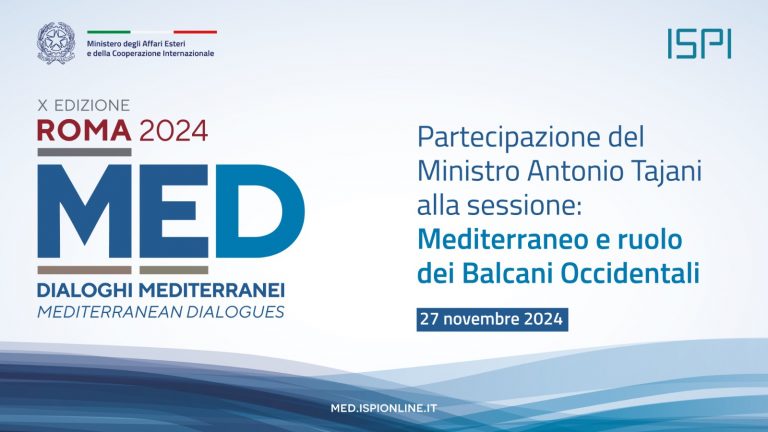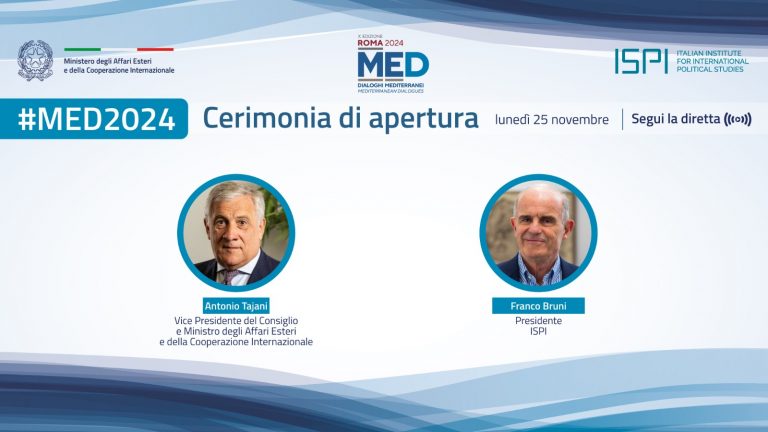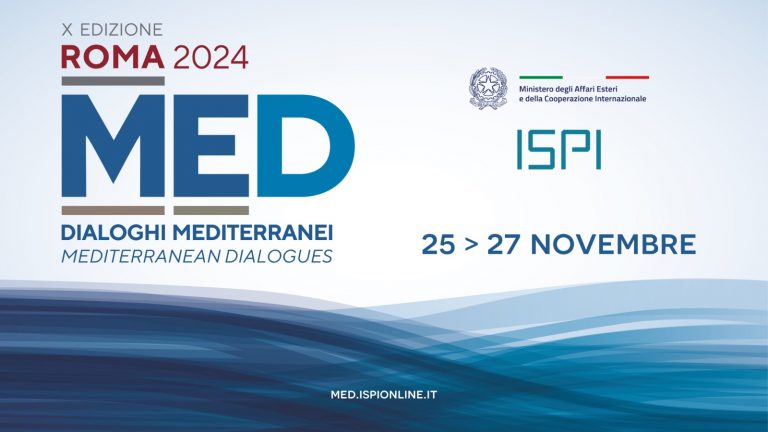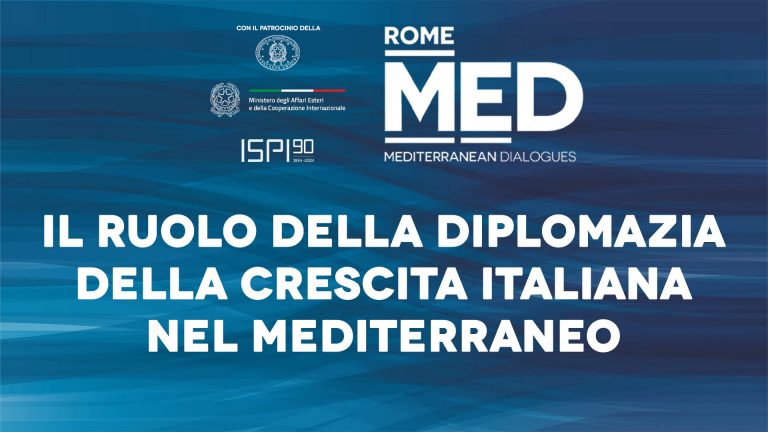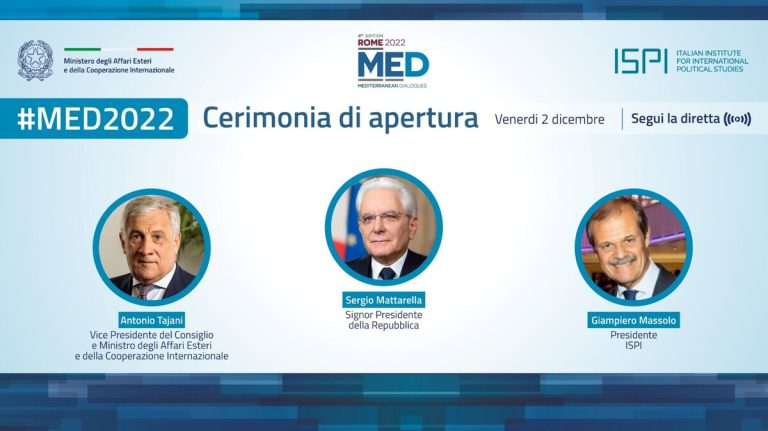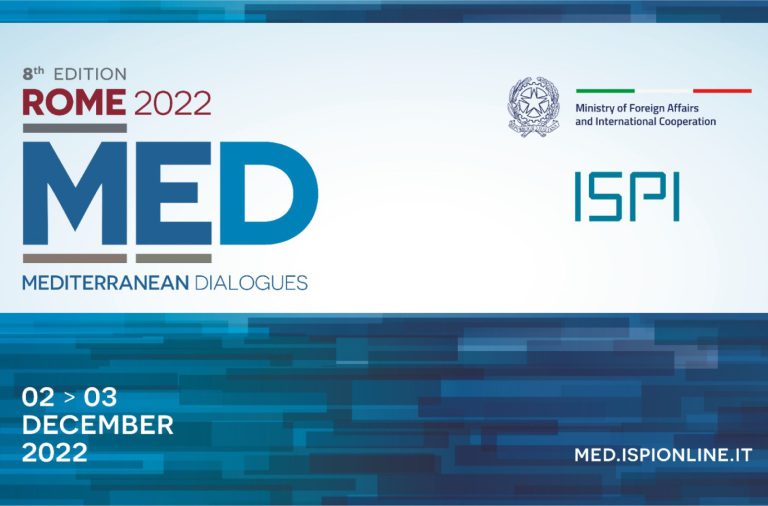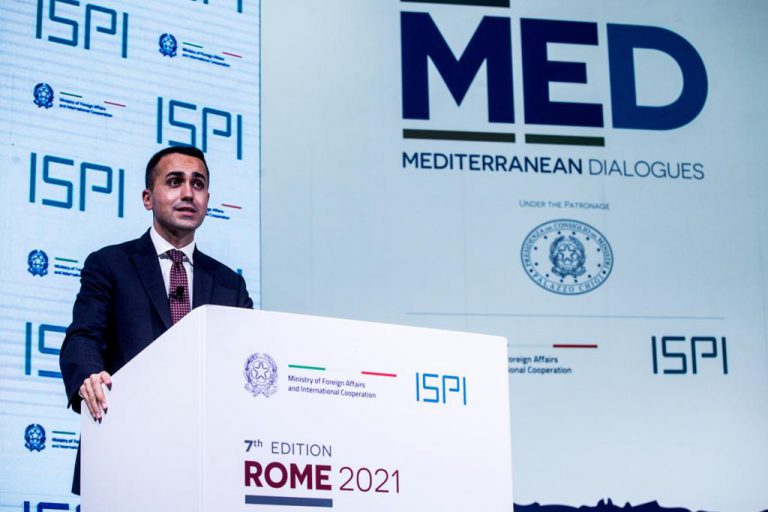Eighth edition of the MED-Dialogues Conference promoted by the Ministry of Foreign Affairs and International Cooperation and by ISPI
“Weathering the Storm: interdependence, resilience and cooperation”
Rome, 25 November 2022 – The eighth edition of the Rome MED – Mediterranean Dialogues, Conference will be held from 1 to 3 December 2022 in Rome, at Hotel Parco dei Principi, Via Gerolamo Frescobaldi, 5. The title of the event will be “Weathering the storm: interdependence, resilience and cooperation”.
The Conference, set up, starting in 2015, by the Ministry of Foreign Affairs and International Cooperation and by ISPI (Institute of Studies on International Politics) will officially begin on Friday 2 December with a greeting by the President of the Republic, Sergio Mattarella and remarks by Antonio Tajani, Deputy Prime Minister and Minister of Foreign Affairs and International Cooperation, Mohamed Bazoum, President of Niger, Mohamed Cheikh El Ghazouani, President of Mauritania and ISPI president Giampiero Massolo. A statement by Italian Prime Minister Giorgia Meloni shall end the MED-Dialogues in the afternoon of Saturday 3 December.
On Thursday 1 December, Rome MED2022 will feature working sessions behind closed doors (the so-called “theme-based fora”) to be attended by experts on the topics dealt with by the Conference.
Currently, the participation of high-profile exponents from across the enlarged Mediterranean region, as well as of representatives from several relevant international organisations, has been confirmed. In addition to the previously mentioned Presidents of Mauritania and Niger, the event will be attended by Prince Hassan Bin Talal on behalf of the King of Jordan; Ramtane Lamamra, Minister of Foreign Affairs, Algeria; Faisal bin Farhan Al Saud, Minister of Foreign Affairs, Saudi Arabia; Ayman Safadi, Minister of Foreign Affairs, Jordan; Fuad Hussein, Deputy Prime Minister and Minister of Foreign Affairs, Iraq; Abdullah Bou Habib, Minister of Foreign Affairs, Lebanon; Najla El Mangoush, Minister of Foreign Affairs, Libya; Riad Malki, Minister of Foreign Affairs and Expatriates, Palestine; Mevlüt Çavuşoğlu, Minister of Foreign Affairs, Turkey; Ahmed Awad Bin Mubarak, Minister of Foreign Affairs and Expatriates, Yemen; Gordan Grlić-Radman, Minister of Foreign and European Affairs, Croatia; Kostantinos Skrekas, Minister of Energy and Environment, Greece; Leo Docherty, Minister of State for Europe, United Kingdom; Tanja Fajon, Minister of Foreign Affairs, Slovenia; Jose Manuel Albares, Minister of Foreign Affairs, European Union and Cooperation, Spain; Yael Lempert, Principal Deputy Assistant Secretary of State for Near Eastern Affairs, U.S.; Robert Malley, Special Representative for Iran; Emanuela Del Re, EU Special Representative for the Sahel; Paolo Gentiloni, European Commissioner for the Economy; Dubravka Šuica, European Commissioner for Democracy and Demography; Nazila Ghanea, UN Special Rapporteur on Freedom of Religion or Belief; Ahmed Aboul Gheit, Secretary-General, League of Arab States; Rafael Mariano Grossi, Director-General, International Atomic Energy Agency (IAEA); Nasser Kamel, Secretary General, Union for the Mediterranean; Kerri-Ann Jones, Deputy Secretary-General, OECD; Geir O. Pedersen, Special Envoy of the UN Secretary-General for Syria, United Nations; Joanna Wronecka, Special Coordinator for Lebanon, United Nations
The Rome Mediterranean Dialogues is the major public diplomacy initiative of the Farnesina, held on a yearly basis. The event, co-organised with ISPI since 2015, gathers institutional representatives, experts, analysts, youths and stakeholders from the civil society, from the economic sphere and from the media to discuss the main challenges in the Mediterranean region and to bolster intra-regional cooperation, based on four pillars: “Shared security”; “Shared prosperity”; “Migration”; “Culture and civil society”. The event aims to promote a high-level, open and informal dialogue on the challenges facing the enlarged Mediterranean to strengthen the role of this region, which is strategic for Italy’s foreign policy, through a shared drafting of a “Positive Agenda”, in order to give new momentum to the whole region: from being the epicentre of crises, the Mediterranean must go back to being an area where its people can thrive and develop, while also being a physical and ideal platform connecting Europe, Africa and Asia.
The high-level sessions scheduled for this year’s edition shall encompass a number of topics, also associated with the impact, on the region, of the war in Ukraine, with a specific focus on energy and food security. In particular, the pillar “Security” will address all the sector or trans-sector priorities involving the region, from unsolved crises to the future of multilateralism and of the world order. The “Prosperity” pillar shall include energy-related issues (security and transition) and food-related issues, water security, the rethinking of global value chains and the adaptation of urban areas to climate change. The “Migration” section will be addressed from a cross-sector standpoint. As for “Culture and Civil Society”, it will include panels dedicated to literature and combating disinformation.
On 3 December, on the sidelines of the Conference, the second session of the Ministerial Dialogue on food security in the Mediterranean will take place. This initiative was launched by Italy last June to respond to the Ukrainian war’s repercussions on the availability of food commodities in a region whose countries are, on average, very reliant on the exportation of grain from Ukraine and Russia.
Over time, MED Dialogues has become an initiative that develops throughout the year: the contribution of ideas and proposals over the past months was consolidated by the publishing of 42 studies and by 25 “Towards MED” panels, featuring eminent international figures discussing the realities in the countries of the region.
In just seven years, ROME MED has become the major international event dedicated to the Mediterranean. The hybrid-format 2021 edition confirmed that this Conference is indeed a global event, for it was followed by over 15,000 people connected from over 100 countries, and this is further proof that its political and scientific relevance goes well beyond the boundaries of the enlarged Mediterranean. On the social media, the event reached 4.1 million views. This year’s edition too will be streamed, at the following link:
In order to follow the event from the virtual platform you must sign up by 30 November, 6:00 pm, by filling in the relevant form. The statements by institutional figures will also be streamed on the YouTube channel of the Ministry of Foreign Affairs and International Cooperation.
The sessions may also be followed directly in the halls hosting the event (Sala Fernandes, Sala Sforza and Sala Farnese) by photographers and TV operators, and in the Press Room, via audio/video link, by accredited journalists in attendance.


